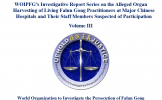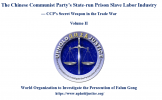Investigative Report on Large Amount of Chinese Government's Capital Spent on Persecution of Falun Gong Practitioners(1)
Index
Summary
- Huge Amount of State-owned Capital Resources were used by the Public Security Organs to Persecute Falun Gong
- Foreign Investment Increased but Utilization Decreased
- Funds Used for Persecution of Falun Gong in Various Areas
Summary
In the 5 years of persecution against Falun Gong from 1999 to 2004, large amount of capital was used to persecute innocent Chinese people. This has created serious problems to China’s economic development.
After initial investigation, the World Organization to Investigate the Persecution of Falun Gong (WOIPFG) found that the political and legislative branches of the government are directly involved in the persecution. Over the past several years of persecution, through the central government and the public finance department's compulsory orders to public finance department at each level, Jiang Zemin required "public funds for political and legislative branches to be at least twice that of other administration units,"[1] "priority guarantee funds for political and legislative department personnel,"[2] and the like. Large amount of funds have been used directly for persecuting Falun Gong practitioners, including establishing and maintaining "610 offices" nationwide[3], expanding and building new police stations, detention centers, labor camps, brainwashing centers, prisons, and similar facilities,[4], [5], [6] as well as for certain special items directly used in the persecution.
In 2002, Beijing Xinan Labor Camp director, Ma Jie, alleged that Xinan Labor Camp had more than 800 people at the time, of which 613 were Falun Gong practitioners. This is 76.625 percent of the labor camp inmates. Cumulatively, over two years it received more than 1,550 Falun Gong practitioners. Six out of the seven brigades were responsible for transforming Falun Gong practitioners. There were 225 policemen there[7]. In China, there are approximately 300 labor camps[8] and 700 prisons[9]. More than 6,000 Falun Gong practitioners have been sentenced; over 100,000 Falun Gong practitioners have been sent to labor camps without trial[10]. In 2001 a deputy director of certain labor camp disclosed that 210,000 Falun Gong practitioners had been detained nationwide and there had been hundreds of thousands of arrests. In addition, according to internal information from the Beijing police, by April of 2001, 830,000 Falun Gong practitioners had been arrested and booked[11]. This does not include those who did not reveal their identities and those who were not recorded for other reasons. The amount of manpower and material needed is obviously great.
In addition, 100 mental hospitals[12] and many drug rehabilitation centers have detained thousands of Falun Gong practitioners, who were forcefully injected or fed with drugs that damage the central nerve system and countless practitioners were sent to "brainwashing centers." By Aug. 26, 2004, 1,032 Falun Gong practitioners were confirmed to have been persecuted to death10.
Investigation of the provinces where the persecution has been most severe (Shangdong Province, Hebei Province, Jilin Province, etc.) proves that the increase in funds allocated to the political and legislative branches is in proportion to the severity of the persecution. Meanwhile, corrupted government officials intensify the persecution in order to receive more funding. With monetary and promotional incentives, corrupted officials at various levels participated in the persecution with little or no concern for the consequences.
In addition to appropriation of money from local public finance departments and the country, another source of persecution funds is from various enterprises and facilities. According to Wu Xiuping, Beijing Women's Coalition deputy chair and a standing committee member of Beijing People's Political Consultative Conference, the government spent tax payers' money to "transform" Falun Gong practitioners. The average "transformation fee" of a practitioner is around five to six thousand yuan.17 Work units and families of Falun Gong practitioners in brainwashing centers have also had to pay high living expenses and “transformation fees.”[13]
According to a CCTV report on Oct. 27, 2001, 259 "education and transform” sessions were held in Bejing’s Chaoyong District in the past 10 months. Close to a thousand Party members participated as teaching aids.[14] Statistics from the same report implies that in one district in Beijing, four to five million yuan were spent on the “transformation” effort in a period of 10 months. This does not include the salaries paid to the roughly one thousand Party member teaching aids, various official business fees, subsidies and other fees. Then how much tax payers' money and other government funds in the last five years would have been allocated in Beijing with so many districts? What an astronomical figure would it then be for the fees used in the "transforming classes" in the countless administrative districts in all of China?
In addition to the political and legislative branches, Jiang Zemin's regime has spent large amount of capital in the areas of news publication, education, science and technology, culture and health for the persecution. To expose the huge disaster brought onto China's economy during the five years of persecution initiative and sustained by Jiang Zemin's regime, this report concentrates on the money spent in the political and legislative system.
1. Huge Amount of State-owned Capital Resources were used by the Public Security Organs to Persecute Falun Gong
In order to sustain the persecution of Falun Gong, Jiang Zemin regime implemented specific policies giving the political and legislative branches financial favors. Such policies include, "public funds for political and legislative branches must be at least twice that of other administration units,"1 and "political and legislative branches personnel must have priority to funds."2
After the persecution began, Lou Gan (head of the central “610 office” and former secretary of the central CCP Political and Legislative Affairs Committee (PLAC))[15], Zhou Yongkang (Minister of Public Security, deputy director of the central CCP Comprehensive Management Committee, deputy Secretary of the central CCP PLAC)[16], and other officials playing a major role in the persecution have been giving many public speeches and issuing many official documents, emphasizing that Falun Gong is the major target of attack. In addition, major departments responsible for persecuting Falun Gong at various levels are managed by PLAC at various levels.[17] Therefore, investments in the PLAC system have been used mostly for the persecution of Falun Gong. Looking from the fiscal outlays over the last several years, funds allocated to the PLAC system in all 31 provinces, autonomous regions, and municipalities directly under the central government has steadily increased (See figure 1).[18] In addition, various locations around the country also allocated special funds for persecuting Falun Gong. We can see from this that increased funding of the PLAC system is not an isolated phenomenon. Rather, it is systematically implemented nationwide with policy protections.
Take labor camps for example, in 2002, Beijing Xinan Labor Camp has over 800 detainees, amongst them 613 Falun Gong practitioners, numbering over 3/4 of the total detainees. In a period of 2 years, over 1,500 Falun Gong practitioners accumulatively were detained there. Six out of the seven brigades are part of the Falun Gong detainee re-education program, utilizing 225 guards.7
In order to carry out the persecution of Falun Gong practitioners, the government invested large amount in brainwashing centers, drug rehabilitation centers, prisons, and psychiatric hospitals. In December 2001, information leaked from a police department alleged that Jiang Zemin once allocated 42 billion yuan in building brainwashing centers. Wu Xiuping, Beijing Women's Coalition deputy chair and a standing committee member of Beijing People's Political Consultative Conference, said that the government spent tax money to "transform" Falun Gong practitioners. The average "transformation fee" of a practitioner is about five to six thousand yuan13. For example, in June 2001 Beijing Haidian District spent 3.6 million yuan to establish brainwashing centers10.
In July 2002, Changde City “610 Office” and Wuling District “610 Office” jointly invested several hundred thousand yuan to build “education centers” to “transform” Falun Gong practitioners.
The Lanzhuo City Gongjia Bay brainwashing center requires each detained Falun Gong practitioner to pay 4,000 yuan per month. The Daqing City Legal Education School (a brainwashing center) requires each Falun Gong practitioner’s work place to contribute 5,000 yuan as management fee, plus, each practitioner has to pay 1,200 yuan for food.13
Chengdu City Xinjin’s brainwashing center has already illegally detained over 500 practitioners, asking each practitioner’s work place to “assist in transforming” their own workers, and also requiring the payment of their living expenses[19].
Similar brainwashing centers are all over China, even exist in corporations and companies. According to Chinese government sources, before the persecution, the Chinese mainland had over 70 million Falun Gong practitioners. One can see from that number that the spending on the establishment and maintenance of brainwashing centers must be enormous.18
A high-ranking official of Liaoning Province Supreme Court once said at a ceremony at the Masanjia Labor Camp that “the financial expenditures for fighting Falun Gong have already exceeded the typical financial expenditures for a major war.”[20]
On July 4, 2001, Radio Australia[21] reported that “almost half” of the detainees inside China’s labor camps are Falun Gong practitioners. In order to detain the increasing number of captured practitioners, the labor camps spent large amount for expansion. For example, the Shanxi Province Yangquan City Labor Camp relocation project cost 19.37 million yuan.
The figure below illustrates how some provinces and cities’ financial resources were used to persecute Falun Gong.

Figure 1. Persecution spending in provinces, autonomous regions and cities from 1999 to 2001
1.1 Beijing: Increase in judiciary spending and drop in basic growth spending
Figure 2 shows Beijing’s spending in various areas from 1998 to 2002[22], [23], [24], [25], [26]. The basic building spending increased in 1999 but fell drastically in 2001 and 2002. Similar trend holds true for Scientific and City Financial Policy spending. Agricultural and Educational spending increased slightly in 1999 and 2001, but also came down in 2002. The rate of increase on Societal Protection and Basic Building spending is going down from 1998 to 2002. The rate of increase on scientific spending is largely flat, and the rates of increase for agricultural, educational, and sanitation programs are very small. However, the executive and legal system spending went from the second to the lowest in 1998, to the top spending slot in 2002, the increase in this category exceeded that of any of the other categories.

Figure 2. Beijing City 1998-2002 Increases in Fiscal Expenditures
Since the start of the persecution, Jiang’s regime and the Beijing city government have invested a large amount of manpower and resources to stop and arrest Falun Gong practitioners from all over the country who came to appeal, which led to the significant increase in executive and legal expenditures. A survey with analysis by the State Department Research and Development Center regarding the issue of peasants going to Beijing for appeal said: “In the second half of 1999, in order to handle the Falun Gong issue and prepare for the 50th anniversary of the establishment of the People’s Republic of China, Beijing and other areas have all tightened the control over people trying to appeal, thus cut down that number.”[27] In early January 2001, according to the Ministry of Public Security insider information, the daily expense at Tiananmen Square alone was between 1.7M yuan and 2.5M yuan, i.e., 620M to 910M yuan per year. Over 95% of the expense went directly to cash payouts to on-site patrol personnel, including uniformed police, plain-clothes police and temporarily employed persons, e.g. temporarily borrowed prisoners serving their terms. Payout was made every day and on the spot without any record or signature other than just the self-reported amount of work.[28]
According to Beijing Finance Department internal materials, in the first 10 months of 2001, the department allocated 32M yuan to “Handle Falun Gong Issue”. 10
In January 2003, Wu Shixiong, the Director of the Beijing Finance Department, emphasized again at the 1st Session of the 12th People’s Congress in Beijing, that “We should carefully allocate funds to support ‘Technology Enhancement for Police’ and ‘Favored Treatment for Police”, to secure more fund for political and legislative departments.”[29]
By August 20, 2004, minghui.org had confirmed 27 deaths from torture in Beijing. The real number is difficult to obtain due to the regime’s information blockade. The Tuanhe Forced Labor Camp, the Beijing Female (also called Xin’an) Forced Labor Camp and district detention centers in Beijing have been major participants in the persecution of Falun Gong. Specifically, the Female Forced Labor Camp had to move twice to accommodate the needs of the persecution, and its expenses are much higher than that before the persecution.10
From the Beijing Finance Department Expenditure Analysis Chart, we can see that since the persecution of Falun Gong, the rate of increase in executive and judiciary areas was at the top three years later, while the other areas dropped significantly or increased only slightly. This shows that with a fixed aggregate fiscal expenditure, in order to meet the Jiang regime’s need to persecute Falun Gong practitioners, the Beijing city government had to consider the costs to sustain the persecution first and, therefore, reduce increases in other areas including social security, capital construction, science, and so on.
In other words, the persecution is at the expense of financial needs of other social areas. The sacrifice in capital construction, science, finance, agriculture and education to make room for the persecution has brought great harm to the healthy development and balance of a society.
1.2 Shandong Province: Largest portion of investment spent on the Persecution of Falun Gong Practitioners
According to verified data from unofficial sources, Shandong is one of the provinces where persecution is most severe. Since July 2000, practitioners have been illegally sent to forced labor camps on a large scale in the province and, in terms of the forced labor time, the province topped the whole country. According to the Forced Labor Law, the shortest term is one year and the longest term is three years. However, 90% of detained Falun Gong practitioners in Shandong spent 3 years in forced labor camps[30].
As of Aug. 20, 2004, 111 Shandong practitioners were confirmed dead from torture. Among them was Zhao Jinhua, who was the first publicized case of death from torture; Su Gang, who was the first case reported in the media of death due to abusive forcible injection of nerve-damaging drugs in the mental hospital; and Chen Zixiu, whose case was the subject of follow-up reports in the Wall Street Journal[31].
The amount invested in the persecution of Falun Gong practitioners in Shandong Province is astounding. Take the seaside city of Qingdao for example, at the beginning of the persecution in 1999, the municipal expenses for the Public Security and Judiciary Departments were 213.46M yuan, a 48.6% increase from the previous year. In 2000, the expenses were 286M yuan, a 34.1% increase over the previous year[32] (Figure 3). Similar to situation in Beijing, when the budget for persecution was not enough, funds for city management and capital construction were reduced.

Figure.3 Public Security and Judiciary Expenditure in Qingdao City from 1997-2001
Similarly, according to data published by Jinan City government [33], in 2002 the money spent on police stations equaled the total amount of the previous five years. Some 90.1% of the police stations in the city have been rebuilt or remodeled. The police stations have been equipped with electronic monitoring systems and the community security personnel have been equipped with pagers. In that year, the executive and legal expenses in Jinan city were 618.52 million yuan, a 35.89% increase from the previous year. The money were mainly spent on salary and incentives to motivate people to participate in the persecution[34]. In the 2002 Summary of Executive and Legal Work by the city government, it was mentioned that they “made a focal point of the focal point to re-educate and transform Falun Gong practitioners” and a “special brigade for the Falun Gong issue was newly established” and an “intensified fight was carried out.” “The Xinhua News Agency internal circulation and the provincial Forced Labor Camp System have published and promoted the experiences from the city forced labor camp, separately”….”The city forced labor camp has been selected as the ‘model work unit in the fight against Falun Gong in our province,’ making Jinan City Prison the ‘provincial modern civilized prison’”.[35] In the brief report of public security work in 2002, it was mentioned that “their work was chosen as No.1 in the province in terms of continuously carrying out the severe persecution on ‘Falun Gong’ thoroughly …,” In addition, “1) A garden-like education center (in fact a brainwashing center) was built in the city. Through the legal education class form…2) Available intense classes based on district in the county (or city).”
The executive and legal expenses of Jinan city in 2003 were 752.49M yuan, a 21.66% increase mainly for salary increases, and in the 2004 budget, a special fund of 115.4M yuan was added, mainly for infrastructure upgrade in executive and legal departments like public security, prosecutors’ offices, courts, prisons, and the like.
1.3 Hebei Province: Prison and Forced Labor Camp Upgrades; a Behind-the-Scenes Look at the “Spring Thunder Act”
Hebei Province is another province where the persecution is severe. According to verified statistics, by August 20, 2004, the number of Hebei Falun Gong practitioners tortured to death was 104.[36] The province has 10 forced labor camps. Falun Gong practitioners are subjected to mental and physical torture in brainwashing centers (such as the one in the capital city of the province, the Xingtai brainwashing center), prisons, detention centers, and other similar facilities[37].
In the 2002 Hebei Province Budget Report[38], the budget for public security offices, prosecutors’ offices, people’s courts and judicial facilities increased 2.23 fold, from 1.92 billion yuan in 1997 to 4.29 billion yuan in 2002. The average annual rate of increase was 17.4%. In 2003, Zhang Chunfu, head of Hebei Provincial Department of Justice said in his work report[39]:“(Hebei province) is in the leading position in terms of educating and transforming criminals. Our approaches and experience have been promoted to our colleagues nationwide by related offices of the Central Committee of the CCP and Department of Justice. Even with a very crowded situation in prisons and a shortage of space in detention centers, we held an additional 15,826 criminals in prisons and 2,924 people for re-education through labor this year (2002)…… It’s noteworthy that we devoted major efforts to initiating the “Spring Thunder Project.” The theme of this project is to educate and transform Falun Gong practitioners and other…”
It was also mentioned in Zhang’s report that, “It (the proposed investment) has now been implemented with the approval from Hebei provincial government and the State Council. The prison remodel and expansion budget was 568 million yuan. 240 million yuan was from the state, with 160 million yuan in place so far, and 328 million yuan from our province, with 94.4 million yuan already available. It has been confirmed that we will construct 2 new prisons, relocate 2 prisons, expand 17 prisons and decommission 3 prisons.
According to a minghui.org report[40] on the “Spring Thunder Project”, in April 2003, the CCP Central “610 Office” and the Ministry of Justice convened a conference in Hebei Province. The conference recommended that the education-through-labor system be implemented nationwide to carry out the so-called ‘Spring Thunder Project’, a project dedicated to ‘transforming Falun Gong practitioners in a concentrated manner.’ At the conference, the Central “610 Office” and the Ministry of Justice forcefully promoted the ‘advanced experience in transformation’ in labor camps in Hebei province and Shanxi province, which is a method of torture called “Restriction Clothes.” The conference specified that labor camps all over the country must ‘transform Falun Gong practitioners’ in the same way. (Note: ‘Restriction Clothes’ refers to forcing a Falun Gong practitioner to wear a specially designed garment and pulling the practitioner’s arms behind the back and binding them in a twisted position. Then the police pull the practitioner’s arms over the shoulder to the chest, tie his legs, and hang him/her up on an iron window with both feet off the ground. The police gag the practitioner with cloth and insert earphones into the practitioner’s ears which continuously broadcast slanderous propaganda against Falun Gong. As soon as this torture method is applied to a practitioner, his/her arms are crippled immediately. The joints at his/her shoulder, elbow and wrists break and fracture instantly. Those who are subjected to this torture method for an extended time will have all the bones of the back fractured and thus be tortured to death with excruciating pain.) The tragedy of Falun Gong practitioner(s) being tortured to death by Restriction Clothes’occurred in the Female Forced Labor Camp of Shibalihe, Henan province.” “Since April 22, 6 Falun Gong practitioners were tortured to death by this torture method. The identities of 3 of them are known: they are Zhang Yali (female), Zhang Boju (female) and Guan Ge (female). It was also known that there was at least one elderly person over 60 years old among the victims.” “According to one information source, many labor camps had great concern and hesitated to use “Restriction Clothes” as a torture method. The labor camp staff worried that they would be held responsible for any casualties. However, the 610 Offices at different levels set hard and fast rules regarding ‘transformation rates’ and correlated it with promotion or demotion, salaries, bonuses, and employee benefits. That is to say, under the instruction of the Central 610 Office, the local 610 Offices at different levels incited and coerced staff members and police in labor camps to do evil deeds. Moreover, after the torture and murder incidents, the Central 610 Office made it clear that neither the labor camp or the responsible person should be investigated or blamed for the tragedy. It was precisely because of this statement from the Central 610 Office that after Falun Gong practitioners Zhang Yali, Zhang Baoju and Guan Ge were tortured to death by “Restriction Clothes,” the Female Forced Labor Camp of Shibalihe, Henan province and the evildoing police in the labor camp haven’t been subjected to any investigation or punishment to date. It’s obvious that applying the torture method of “Restriction Clothes” to Falun Gong practitioners was a systematic state crime committed by Jiang’s political regime, with the 610 Office being the major agent of this evil regime.” This is how tax-payers’ money was used to increase the death toll among Falun Gong practitioners.
1.4 Jilin Province: Dedicated Budget for Persecution of Falun Gong Practitioners
A governmental report in Jilin province[41] directly mentioned that the government bureaus appropriated money dedicated to persecuting Falun Gong practitioners. In the “Report on the Financial Expenditures in 2001 and the Draft Budget for 2002 for Jilin Province,” it stated clearly that in 2001 alone, the Department of Finance of Jilin province “raised 174.89 million yuan” to persecute Falun Gong. (Figure 4)

Figure 4. In this governmental report from Jilin province, it directly mentions the amount of money appropriated to persecute Falun Gong.
The Deputy Governor of Jilin province, Wang Rulin, also stated clearly in the plenary meeting of Jilin provincial government [42] that “Go all out to guarantee the money appropriated for the needs of important projects.” … “We need to pay enough attention to economize on current spending so as to let our focal point stand out. All regions need to rearrange their structure of spending, cut spending on public use, on governmental purchases, at the same time make good use of year-end surplus income and raise funds from all sources to guarantee the minimal budget for social security, to guarantee the funds needed to wage the ‘Strike hard, crack down relentlessly’ campaign on Falun Gong.”
In 2001, the homepage of the Jilin provincial government also outlined its finances that “(Jilin province) enhanced its capability to guarantee the funds for important projects, …… enhanced the investment of funds in “strike hard operation, crack down relentlessly” campaigns against Falun Gong.”[43]
In addition, Jilin province appropriated large funds to implement the “contract policy” to persecute Falun Gong by “six targeting one” or “five targeting one” approach in grassroots units. Basically, what it meant was to require “Street administrative, general cadre, community head, public security staff, family members and the work unit” to sign an agreement to make joint effort to “transform” one Falun Gong practitioner in an attempt to force him/her renounce his/her belief.[44]
Jilin province is among those provinces that have the worst records of persecuting Falun Gong practitioners. Up to August 20, 2004, it has been confirmed that 130 Falun Gong practitioners were persecuted to death in Jilin province, 36 which was second worst on the nationwide list. There are about 20 labor camps and prisons in Jilin province (the Heizuizi Female Labor Camp in Changchun city, the Fenjin Labor Camp of Changchun, the Chaoyanggou Labor Camp of Changchun, the Weizigou Labor Camp of Changchun, the Female Prison of Changchun, the Jilin Provincial Female Prison, the Jilin Provincial Labor Camp, the Jilin Female Labor Camp, the Jilin Municipal Prison, the Jilin Municipal Labor Camp, the Siping Municipal Labor Camp, the Yinmahe Labor Camp of Jiutai City, the Liaoyuan Municipal Labor Camp, the Huanxiling Labor Camp of Jilin City, the Yanbian Labor Camp of Jilin, the Tiebei Prison of Changchun City, the Tieling Municipal Labor Camp, the Xishan Labor Camp of Tonghua City, the Baiquan Labor Camp, and others). All these labor camps and prisons, as well as jails and brainwashing centers have imprisoned Falun Gong practitioners.
Zhang Guimei, a re-education cadre in the Jilin Provincial Female Labor Camp has detained around 800 people categorized as “Falun Gong practitioners and the like.”[45]
1.5 Liaoning Province: Large Investment in Prison Reconstruction
According to a report in The Legal Daily[46], Liaoning Province invested 0.93 billon yuan in 3 years from 2002 for prison reconstruction. In Masanjia of Yuhong District, Shenyang City, over 500 million yuan was invested. In 2003, the first prison city in China was built in Masanjia, which occupies 2,000 mu [329 acres]. Dabei Prison and Dabei Women’s Prison were planned to be moved there. Even though the number of prisons decreased by 38%, but the prison capacity increased by 10,000 people. This report claimed, “This prison reconstruction and reorganization is the largest in scale and investment, and the most influential in Liaoning Province’s prison history.”
The Legal Daily reported, “Liaoning Province Governor Bo Xilai personally chaired a Governor’s Office meeting, and evaluated and approved the plans for reconstructing and reorganizing the prisons in the province. He also reported the plan to the Chinese State Council. Liaoning Province Party Secretary Wen Shizhen personally went to the Judicial Department to hold an on-site meeting in order to solve some issues, such as how to guarantee the allocation of the funds.” Before October 1999, the Masanjia Forced Labor Camp had lost money for many years and could not even pay the electric utility bills. But since the persecution of Falun Gong started in 1999, the local government has allocated 10,000 yuan for each Falun Gong practitioner detained there. From October 1999 to August 2004, over 4,000 Falun Gong practitioners have been detained there; this means that at least 40 million yuan was given to the labor camp.[47]
The Second Women’s Branch of Masanjia Forced Labor Camp, which was established at the end of October 1999, belongs to the Ministry of Justice and is specifically used to detain and persecute women Falun Gong practitioners. Before the persecution of Falun Gong started in 1999, there were less than ten staff members, including the gate guards, in the Second Women’s Branch. But in 2004 there were 100 guards working there and 1,500 Falun Gong practitioners detained there. The ratio of male female guards was 1 to 4. Most of them were young and from the countryside, and were enlisted at the end of 2001. The guards get paid twice per month, and enjoy very good fringe benefits.[48]
In October 2000, a group of Female Falun Gong practitioners in Masanjia Forced Labor Camp were stripped naked and then pushed into the cells of male inmates. By 2004, at least 5 Falun Gong practitioners died from torture, 7 practitioners became mentally-traumatized, and many were disabled. The Ministry of Justice rewarded Su Jing, the Head of the Second Women’s Branch, with 50,000 yuan and gave 30,000 yuan to Shao Li, the deputy head of the Branch, for their active participation in persecuting Falun Gong practitioners. All the labor camp division leaders were rewarded with money, too. The Ministry of Justice of China also allocated a special fund of 1 million yuan to Masanjia to “improve” its environment.48
Besides Masanjia, the Shenyang City’s Dabei Prison, the Dalian City Forced Labor Camp, the Zhangshi Forced Labor Camp, the Longshan Forced Labor Camp, among others, have all become notorious for their cruel torture methods. In late 2001, the Longshan Forced Labor Camp in Liaoning Province was rewarded 400,000 yuan for its active role in the persecution, while the Zhangshi Forced Labor Camp was awarded 50,000 yuan. The guards there openly said, “Without the money, who would do such wicked things?”[49] On May 7, 2004, the Deputy Chief of the second division of the Zhangshi Forced Labor Camp, Tang Yubao, and team leader Jiang Zhaohua repeatedly shocked female practitioner Gao Rongrong with electric batons for six hours, from 3pm to 9pm, and caused her face to become severely disfigured (See Figure 5).[50]
 Falun Gong practitioner Ms. Gao Rongrong, an accountant at the Luxun Fine Arts College in Shenyang City |
 On May 7, 2004, Gao Rongrong's face is covered with burns from electric baton shocks. The picture was taken ten days after the torture |
Figure 5. Gao Rongrong was disfigured in Longshan Forced Labor Camp
By August 2004, a total of 113 Falun Gong practitioners were tortured to death in Liaoning Province.
From the money that Dalian City in Liaoning Province has allocated for the Executive and Legal system,[51] we can see that, in contrast to the investments on urban construction (Figure 6) and infrastructure construction (Figure 7), Liaoning Province’s spending in the Executive and Legal system (Figure 8) has increased by 4.67 times in 4 years.

Figure 6. Dalian City’s investment on urban construction from 1997 to 2002

Figure 7. Dalian City’s investment on infrastructure construction from 1997 to 2002

Figure 8. Dalian City's Spending in its Executive and Legal System from 1997 to 2002
The 2002 Dalian City Almanac[52] stated, “In 2002, to guarantee the smooth operation of the Public Security, the prosecutors’ office, and the judiciary departments, the spending in these areas continued to grow at a rate of 8.8 percent per year, while growth rates of the administrative and other department funds were zero. At the same time, special funds for “Investigation through scientific means” and other areas were set up for strengthening the information system in the prosecutors’ office.” “Actively engaged in the battle with ‘Falun Gong,’ smashed many times…, and received positive comments from the central CCP and the related provincial branches.”
1.6 Heilongjiang Province: Where Do the Huge Rewards Come From?
Government agencies at various levels in China use huge cash rewards to encourage the capture Falun Gong practitioners. The reward for “reporting” a Falun Gong practitioner ranges from 500 yuan, to several thousand yuan, to ten thousand yuan (Figure 9)10.
|
Open Letter to Falun Gong Practitioners In line with the instructions of the administration and management committees of the development region, we shall intensify the persecution on the evil organization Falun Gong. Those who still stubbornly insist on practicing Falun Gong after long-term and patient persuasion and reformation, who still keep in touch with one another and share their experiences, and who still go to Beijing to cause trouble, will be dealt with relentless blows. The punishment measures are as follows:
4. Reward those who monitor and report practitioners with 500 yuan to 1,000yuan. May 2000 |
Figure 9. Open letter posted by the Neighborhood Committee Office
Falun Gong practitioner Wang Yuzhi from Heilongjiang Province, now living in Canada, said in her witness report,[53] “Because a few practitioners and I had prepared truth-clarifying materials, in October 2000, the police ordered our arrests on the Internet with a reward of 50,000 yuan. Later, on July 16, 2001, when I went to a bank to draw some money from my account, the bank reported me to the police and I was arrested as a result.”
The “610 Office” of Heilongjiang Province allocated funds to all neighborhood committees and hired “security personnel” for each residential section to monitor the Falun Gong practitioners in their neighborhood. The monthly reward is 200 yuan. They also put up posters on the front gate of each residential section, saying that reporting one Falun Gong practitioner will be rewarded with between 500 to 1000 yuan.[54]
Daqing City’s Hongweixing Brainwashing Center, officially called the “Legal Education School,” was jointly set up by Daqing Municipal Government, Daqing Oil Ltd. and Daqing Oil Management Bureau in November 2002. The Daqing Oil Management Bureau and Daqing Oil Ltd. invested over two million yuan, which was used to purchase vehicles and electric monitoring equipments for the persecution of Falun Gong practitioners.[55]
According to investigations by the WOIPFG[56], Heilongjiang Province is one of the provinces where the persecution of Falun Gong is the most severe. By Aug. 20, 2004, 155 Falun Gong practitioners from Heilongjiang Province were confirmed dead as a result of the persecution. This placed Heilongjiang Province in first place in China in terms of the number of deaths of Falun Gong practitioners.
1.7 Sichuan Province: Increasing the Budgets for the Police Departments, the Prosecutor’s Offices and the Courts to Intensify the Persecution of Falun Gong Practitioners
The 2002 and 2003 (draft) Sichuan Province budget report[57] said, “The police, the prosecutor’s offices and the courts spent 72.4 million yuan, …an actual increase of 14.07 percent.” The budget for 2003 (draft) mentioned that the reasons for the increase in the budget were: “to strengthen the level of financial guarantees for dealing with ‘Falun Gong.’” “In 2002, fees for lawsuits were channeled into the budget according to regulations, so increased expenditures for the police, the prosecutor’s offices and the courts are needed.”
According to the investigation by WOIPFG on Chengdu City, Sichuan Province,[58] by August 2004, at least 71 Falun Gong practitioners were confirmed dead. Some special units, such as the Chengdu City Detention Center (with Li as its head), the Chongzhou City Detention Center (with Luo as its head), the Chuanxi Women’s Prison (section heads: Wang Yaxin, Gao Mei), brainwashing centers in various townships and counties as well as regional hospitals in Chengdu, have served as bases to detain and persecute Falun Gong practitioners. The Sichuan Women’s Detention Center in Nanmusi, Gongmin Town, Zizhong County, Sichuan Province detained 762 Falun Gong practitioners from November 15, 1999 to February 27, 2002.[59]
2. Foreign Investment Increased but Utilization Decreased
As per the statistics of the Ministry of Commence of China[60], the total investment of the U.S. in China in 2002 was US$5,556 million. From January to December 2003, 41,081 foreign investment companies were approved for founding, which was an increase of 20.22 percent over the previous year. Total contracted foreign investment amounted to US$115,070 million, which is an increase of 39.03 percent than the same period from the year before. However, the actual foreign investment reported as utilized was US$53,505 million, an increase of only 1.44 percent over the year before.[61]
By the end of 2003, 465,277 foreign investment companies had been approved and established in China. Total contracted foreign investment amounted to US$943,130 million and total foreign investment utilized was US$501,471 million. According to the statistics of the Ministry of Commerce of China, American companies have invested US$40,000 million in over 40,000 projects in China. Exports by foreign investment companies amounted to 55 percent of the total exports of China.

Figure 10. Total Foreign Direct Investment into China vs. Actual Usage Utilization of the Investment during 1997-2003

Figure 11. Total Foreign Direct Investment into China vs. Actual Utilization of the Investment during 2002-2003
However, a big gap exists between the investments made into China and the actual utilization of these investments[62]. It can be found from the data of the Ministry of Commence of China, which was published by the US-China Business Council (USCBS), that the gap was not that big before 1999 (when the persecution started) (Figure 10). Since 2000, the gap between the amount contracted (green column) and the amount recorded as utilized (red column) has clearly increased. During 2002-2003, foreign investment increased 39.03 percent, but the total amount reported utilized only increased 1.44 percent. (Figure 11)

Figure 12. Growth Rates of Various Investment Types and Amounts Reported Utilized in 2003
Figure 12 shows the increase of different investment types and amounts utilized in 2003. The amount utilized for the joint resource exploration was minus 87.7 percent. Among them, the U.S.’s total investment in China was 115,070 million yuan, but actual amount for which records of utilization were provided was 4.2 billion yuan.

Figure 13. U.S.’s Import and Export Amounts from U.S.-China Trade, 1997-2003
From the data published by the U.S. International Trade Commission, U.S. Department of Commerce, in U.S.-China Trade from 1997-2003, the U.S.’s Import Trade to China (blue column) is far bigger than Export Trade (purple column). The negative trade balance in 2003 was 134,080 million yuan. According to data published by the Chinese Ministry of Commerce,60 products exported to the U.S. mainly include manufacturing products, including, electric power equipment, electronic products, toys, furniture, shoes, clothing, leather, plastic and small commodity, steel and iron, and medical treatment equipments. From Figure 13, we can see that the US import from China is far more than the export to China. The difference increases every year.[63]
2.1 Flow of Huge Amount of Foreign Investments—Persecuting Falun Gong
As previously mentioned, Jiang’s regime directly ordered that the amount allocated to the executive and legal departments would be “double that of other administrative enterprises.” In order to maintain an escalating policy of suppression, how does Jiang’s regime solve the problem of funding sources? Looking at it from evidence obtained right now, in recent years government officials at different levels who have been actively participating in the persecution of Falun Gong have actively participated in attracting foreign investments by means of relaxing policies and other means.
Take Tianjin as an example. The expenses of executive and legal organizations in Tianjin have been increasing in successive years. The report of the 2002 budget operating statement explicitly pointed out using special expenditure to persecute Falun Gong, “Added …special equipment to suppress ‘Falun Gong.’ The expenditure of the legal system was 1.79 billion yuan, an increase of 15.2 percent” [64] According to the Xinhua News Agency report, in August 2000, 3,546 “support and education groups” were established, composed of Party members and cadres in Tianjin.They brainwashed Falun Gong practitioners by means of one (aide) to one (practitioner), several to one or a group to one. [65]
In March 2004, while the U.N. Human Rights Commission meeting was taking place, Zhang Lichang, Tianjin City Party Committee Secretary (from May 1998) who was directly responsible for the persecution[66], led the Chinese Communist Party Delegation and Tianjin Economic and Trade Delegation to the U.K., Holland, Switzerland and Germany to attract foreign investment. During a few days’ visit in the UK[67], Zhang Lichang and delegation members went to the headquarters of GlaxoSmithkline and the London Emergency Communication Command Center, the headquarters of the KFI Group, to inspect the facility and meet with board chairmen and presidents of 17 big corporations. They met with corporate officers from U.K. Standard Life Insurance, Charter Bank, Mianfeng Company, KFI Corporation, Motorola, B&Q, Kruce Company, and other high-tech groups, involving multiple fields and professions, including industry, finance, insurance, commerce and so on. The Tianjin City Economic Committee, Tax-Protection District, New Tech Garden District, and City Medical Group all signed agreements for joint ventures and cooperation. The total amount of investment was US$300 million.
3.Funds Used for Persecution of Falun Gong in Various Areas
3.1 Science and Technology
Over 6 billion yuan has been spent on the “Golden Shield Project” that has violated human rights and served to maintain the suppression of Falun Gong. On September 26-27, 2002, one of the Ministry of Public Security’s “Golden Shield Project” group leaders, Li Runsen, explained, “The Golden Shield Project is ‘a project to modernize the information system of the public security system. It is the equivalent of the construction of an electronic police force throughout the nation.” Among the objectives of the “Golden Shield Project” is the building of a strong “Internet police force.” In a meeting, Li Runsen specifically stated, “Jiang Zemin has emphasized that ‘information and Internet security is related to national security.’” He also pointed out that the Chinese Ministry of Public Security proposed the “Golden Shield Project” in 1999 and plans to complete it around 2006.[68] The number of Internet police officers who monitor the flow of information on the Internet is projected to reach several hundred thousand.10
Development of software that will intercept information and prevent facts about Falun Gong from being spread: According to the Software Industry Project Information web site of Shenyang City, Shenyang Sitou Network Technology Ltd. has invested one million yuan to develop the “Technology for Illegal Internet Information Recognition and Filtering Based on NLP,” by which they have become directly involved in the persecution of Falun Gong. According to the web site, “This system is Internet information security software that utilizes the technology of natural linguistic analysis to intercept, filter or alarm the covert police monitoring the Internet whenever it detects illegal information (such as pornography, Falun Gong or classified materials) on the Internet. It has been widely used on personal computers, LANs and web sites by Internet monitoring departments.”[69]
3.2 Education
China’s investment in education has always been below the international standard. On September 9 to 21, 2003, at the invitation of the Chinese government, the UN Human Rights Committee’s reporter, Ms. Katarina Tomasevski, conducted an investigation into China’s educational situation.[70] Later, she publicized her findings to the media and said, “The budgetary appropriation for education in China is only two percent of the Chinese GDP.” In the U.S., it is five percent of the country's GDP, and in other developed countries, the annual investment in education ranges between five and seven percent. Despite the mere two percent of GDP purportedly invested in education in China, however, a great deal of that funding in recent years has not actually gone towards education.
Chen Zhili, the Minister of Education and Party Secretary of the Chinese Ministry of Education, actively implemented and promoted Jiang's repressive policy, exhausting a large proportion of the funds earmarked for education by diverting them to the persecution of Falun Gong. Specifically, those funds were used for blocking any information on the Internet about Falun Gong and requesting that all higher educational organizations redirect their technological research and development toward Internet monitoring and blocking. Aside from making concerted efforts to develop new Internet monitoring and blocking software and providing technical support for the new technology, they also requested that the educational departments at all levels provide, under the direction of the local Party Committees, various kinds of campus-wide “seminars,” performances, photo exhibits, calligraphy and painting shows, popular science demonstrations, student organization activities, bulletin board displays, posters, videos, VCDs, and student publications, all aimed at defaming Falun Gong. They have also incited students to demonstrate in the streets and distribute anti-Falun Gong flyers and VCDs.[71]
According the an official report by the Chinese government, on the day of February 6, 2001 alone, under the close command of the Director of the Central Government’s “610 Office,” Wang Maolin, the first secretary of the Central Youth League, Zhou Qiang, and the head of the Central Youth League’s Party Secretary Committee, Zhao Yong, eight million juveniles in nearly one thousand communities throughout one hundred medium to large cities in China posted over five hundred thousand propaganda pictures, distributed over one hundred million flyers and held over two hundred rallies to defame Falun Gong.71
In early 2004, an “Anti-Cult Education and Demonstration Movement” targeting Falun Gong was initiated throughout China.[72] The definition of “cult” in China is very broad, encompassing such mainstream groups as the Roman Catholic Church, the Orthodox Catholic faiths, many Protestant faiths, traditional Tibetan Buddhism, and many others. But the brunt of the attacks on spiritual groups has been borne by Falun Gong since 1999. This is a new, systematic, political movement that has been well-documented, purposely programmed and elaborately planned by the Jiang regime since its suppression of Falun Gong began in July 1999. The movement covers both rural and urban areas, all colleges, high schools, primary schools and neighborhood communities in various cities. It extends from developed regions like Beijing and Shanghai along the coastal areas, as well as the construction regiments in less developed areas like Xinjiang Province. The costs for printing the propaganda materials for this movement were paid for partially by the Central Government and partially by local funds. For example, in the West Hunan Autonomous Region, in addition to the free materials donated by the Central Government, the local government itself spent 200,000 yuan in the printing of these materials.
By the end of 2002, China had 1.17 million educational institutions, including primary and secondary schools of various kinds, with a total enrollment of about 318 million students. [73] It costs a great deal to hold these multifarious sorts of activities defaming Falun Gong in so many colleges and schools. Requiring that colleges and/or schools forcefully instill into students a hatred and hostility towards the Falun Gong group that practices “Truthfulness-Compassion-Tolerance,” forcing students to go against their own consciences by participating in the “Million Signature” activity and motivating families and society to get involved in the anti-Falun Gong movement will cause the foundation of social morality to collapse.
3.3 Researchers Paid to Provide Theoretical Basis for the Persecution of Falun Gong Practitioners
To fuel the anti-Falun Gong campaign taking place all over China, Jiang’s regime has allocated a large amount of funds to research organizations. Their objective is to provide a theoretical basis for persecuting Falun Gong practitioners.[74]
For example, since 2001, the Sichuan provincial Party committee and government have annually allocated 1 million yuan to the Sichuan Province Academy of Social Sciences as key project funds. The purpose of this money is to encourage and reward anti-Falun Gong research.
High-ranking officials in the Chinese government and the Communist Party with backgrounds in religion or science initiated the “China Anti-Cult Association”. Through the participation of the government and its media, and by taking advantage of its members' backgrounds in religion or science, the association has been “justifying” the Chinese government's persecution of Falun Gong, suggesting measures of persecution to the Chinese government, fabricating anti-Falun Gong propaganda, and directly participating in numerous forms of persecution, including "transforming" Falun Gong practitioners.
According to Wang Yusheng, the deputy director and secretary-general of the "China Anti-Cult Association,” 24 anti-cult associations have been established across China as of October 2003 and 7 provinces and autonomous regions are actively making preparations for them. Their main function is to use propaganda to defame Falun Gong. Since the founding of the "China Anti-Cult Association" in November 2000, the national and local associations have held about 1,000 exhibitions, given about 1,000 reports, lectures and forums, set up a website for the "China Anti-Cult Association," edited more than 20 movie and television productions, and published 400,000 items. Since 2004, anti-cult associations have been continuously set up in various regions. Through Chinese embassies, the associations have held anti-Falun Gong picture exhibits in Switzerland, Singapore, Korea, the Hague in Holland, and Paris, France. Apparently, they have exported their hate propaganda overseas.
The Beijing City Scientific Committee once allocated 1.1 million yuan to set up the Beijing City Anti-Cult Association and support its activities. The source of funding for this association includes "relevant units’ subsidization" and "finance appropriation".
3.4 Controlling the Media
When talking to Mike Wallace of CBS’s 60 Minutes program, Jiang Zemin acknowledged straightforwardly, "Media should be the mouthpiece of the Party."
According to incomplete statistics, from January 2000 to October 2003, there were 522 articles slandering Falun Gong on the Xinhua News Agency website.[75]
Since the persecution of Falun Gong began on July 20th, 1999, China’s Central TV station has been actively supporting the persecution and has fabricated numerous news items to falsely accuse and slander Falun Gong. From April 25, 1999 to the end of 2003, the "Focus Interview," "News," "Science and Technology Channel," "Viewpoint Weekly Publication," "China Diplomacy Forum," "TV Critique," "China Network and Media Forum" and the "Life Channel” groups broadcast at least 332 such items. When the falsehoods and persecution were hard to maintain, CCTV and Xinhua news agency concocted the "Tiananmen Self-immolation," the "Beijing murder case," and the " Killing of Zhejiang Province beggars by poison case" (for details see reports from the World Organization to Investigate the Persecution of Falun Gong) among others, to frame Falun Gong. These news items have played an extremely despicable role in inciting people's hatred towards Falun Gong.[76]
All varieties of propaganda materials have been manufactured to slander Falun Gong and incite hatred, including books, many kinds of pamphlets, and VCDs.
In the literary and arts circles, all Falun Gong-related books and publications were destroyed nation-wide.[77] The government invested funds to produce movies, television series, traditional operas, modern dramas and stage plays, all to slander Falun Gong, and then broadcast these programs all over the country.
Production of the film “Universe and Man,” considered to have played a prominent anti-Falun Gong role, was funded by the government, to the tune of more than 1 million yuan.[78] The Beijing Science and Education Film Company contributed another 1 million yuan to the production. The Nine Departments and Ministries of the Central CCP and State Council issued an official document ordering the promotion of this film. Production of another anti-Falun Gong film, “Abyss – Essence of a Cult,” was also funded by the government, which invested 2.6 million yuan in its production. [79]These major anti-Falun Gong films, including “Abyss – Essence of a Cult” and “Out of a Death Trap” (produced by the Shanghai Motion Picture Company), did poorly at the box office. The Chinese movie market was still in deep crisis.[80]
The government, at all levels, forced people to watch these movies. For example, in September 2002 in Inner Mongolia, ten organizations of the Erdos Municipal Government jointly issued a notice requiring staff members and employees of the following groups to watch three anti-Falun Gong films: all district governments within Erdos City; all departments and organizations directly under the municipal government; all non-governmental organizations or groups; and all major businesses and institutions in the city. The three films were “Abyss – Essence of a Cult,” “Out of a Death Trap” and “Flower Street” (produced by the Inner Mongolia Motion Picture Production Company). Among the ten issuing organizations were the following: the Erdos City Organization Department; the Erdos City Propaganda Department; the “610 Offices” and the Industrial Commissions of the organizations directly under the municipal ministry; the Culture Administration; the Education and Physical Education Administrations; the Radio, Film and Television Administration; the Science and Technology Association; the Labor Union; the Chinese Communist Youth League and the Women’s Association. They also ordered that all media at the various levels use all available means to actively promote this event and the three films.[81]
To prevent Falun Gong practitioners from broadcasting truth-clarification material by tapping into CCTV programs, China spent more than 1 billion yuan to convert the satellite broadcasting system into fiber-optic cable broadcasting system.
During the quarter between March 2002 and June 2002, in order to prevent practitioners from tapping into local cable systems to clarify the truth about Falun Gong, the Changchun Municipal Government spent more than 1 million yuan to dispatch massive numbers of staff members from governmental organizations and hired more than eight hundred additional people to guard every wire pole, 24 hours a day.10
3.5 Spending Billions to Extend the Persecution Overseas
To attack the overseas Falun Gong groups and their activities for opposing the persecution, Jiang issued the order to “strengthen the overseas battle (against Falun Gong).” Thereupon, the suppression of Falun Gong became the principle and emphasis of Chinese foreign relations work. The ambassadors, consuls, attachés, and staff members at every Chinese embassy and consulate located in foreign countries complied with the edict by disseminating the domestic hate propaganda overseas through every available means. They deprived overseas Falun Gong practitioners of their legal rights and promulgated the persecution policy in foreign countries. The amount of capital dedicated to this effort was enormous. [82]
A large number of high quality printed pictures and posters that slandered Falun Gong were sent to the Chinese embassies and consulates all over the world to set up large-scale exhibits in Canada, U.S., Italy, Switzerland, Austria, the Netherland, Russia, Belgium, France, Germany, South Korea, Thailand, Indonesia, Singapore, Japan, Australia and New Zealand.
They sent out hate-filled propaganda booklets as “official diplomatic letters” to every level of government, officials, media and non-governmental organizations in every country.
Massive manpower from the National Security Bureau, Public Security Bureau, the Internet police network and Customs Police were used to collect personal information on overseas Falun Gong practitioners and to create an overseas blacklist. It was estimated that in Southern California alone, there were at least one thousand Chinese secret agents working on this effort.
The Jiang regime also bribed various overseas media to propagate the attack against Falun Gong.
China provided massive amounts of free financial aid to certain developing countries in exchange for their votes against proposals condemning China’s human rights record in various meetings such as the United Nations Human Rights Conference.10
By using various means, such as directly controlling or financially influencing those independent media that do business with China, purchasing air time and advertising time and sending out government officials to work for the independent media, the Jiang regime attempted to influence and control the Chinese media in the western developed countries. 10
Reference:
[1] Report on Qingdao City's 1999 Fiscal Planning and Execution and Draft of 2000 Fiscal Planning (Back)
[2] Implementation Suggestion on Implementing "Two lines of Revenue and Expenditure" Stipulation, November 6 (Back)
[3] 2002 Fiscal Budget of Haizhu District, Guangzhou City (Back)
[4] Report on the implementation of the budget for 2002 and the budget for 2003 (draft), Jinniu District, Chengdu City (Back)
[5] Report on Partial Changes to 2001Provincial Level Fiscal Planning, October 24, 2001, during the 26th meeting of the 9th National People's Congress standing committee, Head of Jiangsu Province Fiscal Bureau (Back)
[6] Report on Nanhai City 2000 Fiscal Planning and Implementation and Draft of 2001 Fiscal Planning (Back)
[7] "Learn from Comrade Fang Gong, Earnestly Carrying Out Duty" (Beijing Xin An Labor Camp director, Ma Jie) (Back)
[8] "Creating the Characteristic of Labor Education Displays Judicial Administration Moving Towards Humanity" (April 28, 2004) (Back)
[9] "Mainland Prison Reform Touches the Interests of 700 Prisons," Yang Jianmin, Reporter; Fenghuang Weekly issue 126. (Back)
[10] Clearwisdom.net Dada Center
http://www.clearwisdom.net/emh/special_column/death_list.html (Back)
[11] Epochtimes report: The Footsteps of Falun Gong Eleven-year Journey (Back)
[12] WOIPFG: Investigative report on the Psychological Persecution of Falun Gong Practitioners (April 30, 2004) (Back)
[13] WOIPFG: The investigation report on the genocide both physically and psychologically of Falun Gong practitioners group through “transformation,” (April 28, 2004) (Back)
[14] CCTV International Channel reported on October 27, 2001 (Back)
[15] WOIPFG: The evidence of Luogan’s persecution of Falun Gong, International Investigation Organization of Persecution of Falun Gong Feb.14th 2004
http://www.zhuichaguoji.org/node/145 (Back)
[16] Investigative Report of Zhou Yongkang’s persecution of Falun Gong (July 20th 2004)
http://www.zhuichaguoji.org/node/23301 (Back)
[17] The Function, Agency and Personnel Regulations of Chinese Communist Party Political and Law Committee in Congwen District of Beijing City (Back)
[18] The National Financial Spending (1999 to 2001) (Back)
[19] Chengdu City Xin Jin’s brainwashing center recently captures 500 practitioners, Minghui Net, November 3, 2003.
http://www.minghui.org/mh/articles/2003/11/3/59970p.html (Back)
[20] Epochtimes: Covered-Up Tragedy: Government Accusations on Falun Gong
Report on Liaoning Province documented persecution of Falun Gong (One)
http://www.epochtimes.com/gb/4/1/6/n443720.htm (Back)
[21] Calls for End to China's Falun Gong Re-education Camps, Jul 4, 2001, ABC.
http://www.abc.net.au/news/2001/07/item20010704200115_1.htm (Back)
[22] Report on Beijing City 1998 Fiscal Planning and Execution and Draft of 1999 Fiscal Planning (Back)
[23] Report on Beijing City 1999 Fiscal Planning and Execution and Draft of 2000 Fiscal Planning (Back)
[24] Report on Beijing City 2000 Fiscal Planning and Execution and Draft of 2001 Fiscal Planning (Back)
[25] Report on Beijing City 2001 Fiscal Planning and Execution and Draft of 2002 Fiscal Planning (Back)
[26] Report on Beijing City 2002 Fiscal Planning and Execution and Draft of 2003 Fiscal Planning (Back)
[27] “Appeal Incidents and the System for Appeal – A Survey and Analysis On the Issue of Peasants Going to Beijing for Appeal”, by Zhao Shukai from the State Department Research and Development Center (Back)
[28] WOIPFG “Jiang’s Regime Utilized Great Amount of National Financial Resources to Persecute Falun Gong”, March 20, 2003 (Back)
[29] Report on Beijing City 2003 Fiscal Planning and Execution and Draft of 2004 Fiscal Planning (Back)
[30] “Brutality in Wang Village Forced Labor Camp in Zibo City, Shandong Province: Deprive of Sleep to Brainwash and Electric Shock in Water Cell for 24 hours”, Minghui Net on August 6, 2003 (Back)
[31] “In face of bloody wind and rain on the land of dark Qilu, a bright road lies ahead with righteous belief in heart”, Minghui Net (Back)
[32] Report on 2000 Budgetary Expenditure and 2001 Budgetary Proposal of Qingdao City (Back)
[33] Police Station Construction in Provincial Capital City (Jinan) Upgraded Thoroughly (Back)
[34] Report on 2002 Budgetary Expenditure and 2003 Budgetary Proposal of Jinan City (Back)
[35] A Brief of Jinan City Judiciary and Administrative Work in 2002 (Back)
[36] Minghui Net database:
http://library.minghui.org/category/32,96,1.htm (Back)
[37] WOIPFG Investigation report on the Officials in the CCP Committee, Government and the "610 Office" in Hebei Province Who Participate in the Persecution of Falun Gong Practitioners (Back)
[38] Report (Draft) on financial budget at provincial level and the implementation of the overall budget in Hebei province in 2002 and provincial budget for 2003, by Wang Jialin, head of Department of Finance of Hebei Province. January 10, 2003 (Back)
[39] Excerpt from the working report of the head of Hebei Provincial Department of Justice Zhang Chunfu (November 25, 2003) (Back)
[40] Minghui Net (September 20, 2003) Central 610 Office promotes torture method “restriction clothes” in education-through-labor system in April this year. (Back)
[41] Report on the financial spending in 2001 and the draft budget for 2002 for Jilin Province (Back)
[42] Jilin Political Affairs Net: Deputy governor of Jilin province Wang Rulin calls for economizing spending. (Back)
[43] Jilin Province Government Net: Outline of finance of Jilin province. (Back)
[44] Public office of political affairs of Changchun Municipal Government: raise the level of understanding, carrying out the political work at street/community level sincerely. (Back)
[45] China Women June 16, 2001 (reporter He Li) Walk You to the New Life—Jilin Provincial Women Forced Labor Camp Guard Zhang Guimei. (Back)
[46] 46 “Marching Toward Modernized Prisons – The On-Spot Report of the Reorganization of the Prisons in Liaoning Province,” November 27, 2002, The Legal Daily, by Huo Shiming and Li Hong (Back)
[47] Minghui Net April 30, 2004. The inside story of the Illegal forced labor and money robbery in Masanjia Labor Camp, Shenyang (Back)
[48] “Women Falun Gong Practitioners Became Mentally Traumatized under Torture – The Dark Inside Stories of Masanjia Forced Labor Camp, which Is Under the Leadership of Bo Xilai,” May 2, 2004, from Minghui net
(http://www.minghui.org/mh/articles/2004/5/2/73692.html) (Back)
[49] “Putting His Visit to Germany on Hold, Bo Xilai Meets Troubles when He Visits the United States with Wu Yi – International Organizations Asks the United States to Expel Bo Xilai According to Article 212(a)(2) (G) of the Immigration Law. Secret China News, April 20, 2004,
https://www1.beijing999.com/dm/uggc/jjj.xnamubatthb.pbz/arjf/negvpyrf/4/4/20/63737.html (Back)
[50] Clearwisdom.net reported on Aug. 28, 2004. Failing to Destroy Her Faith, Jiang's Followers Disfigured Her Face
http://www.clearwisdom.net/emh/articles/2004/8/28/51814.html (Back)
[51] The Report on Dalian City’s Budgets Operating Statement from 1997 to 2002 (Back)
[52] Dalian City Almanac in 2002 (Back)
[53] Life full of ups and downs – Biography of Falun Gong practitioner Wang Yuzhi, Wang Yuzhi (Back)
[54] Minghui Net March 15, 2004. The “610 Office” in Mudanjiang City allocates funds to employ “security personnel” to monitor Dafa practitioners (Back)
[55] Minghui Net December 18, 2003: two million of people’s sweat money is used for persecuting people –inside story of Daqing City’s Hongweixing Brainwashing Center (Back)
[56] Investigation report on the “610 Office”---Heilongjiang Province, December 4, 2003, the Committee to Investigate the Crimes of the “610 Office” in Their Persecution of Falun Gong (Back)
[57] Report on the implementation of the budget for 2002 and the budget for 2003 (draft), Jinniu District, Chengdu City (Back)
[58] Investigation report by WOIPFG on the persecution of Falun Gong by Chengdu Party Committee and Municipal Government (July 17, 2004)
http://www.zhuichaguoji.org/node/249 (Back)
[59] china-woman.com: The School that Saves Soul – Stories of How Staff in Sichuan Female Detention Center Transform “Falun Gong”, by Hou Jiangang (Back)
[60] Utilization of foreign direct investment utilized in January-December 2003 (source: information office of Ministry of Commerce) (Back)
[61] Six Major Financial Issues Need to Be Concerned , Shanghai Financial Review, by Shanghai Consulting Association, Issue 9 of September, September 1, 2003 (Back)
[62] Data published by The US-China Business Council (USCBC):
http://www.uschina.org/statistics/fdi1979-03.html (Back)
[63] US International Trade Commission, US Department of Commerce (Back)
[64] Report on Tianjin City 2002 Budget Operating Statement and 2003 Budget Draft, Yang Fugang (Back)
[65] Xinhua News Agency reported on August 9, 2000 (reporter Liu Qinglu). Doing Well in Reformation of “Falun Gong” Practitioners with High Standard in Tianjin (Back)
[66] WOIPFG Zhang Lichang Report: Partial Persecution Facts Conducted by Zhang Lichang, Secretary General of Tianjin City Communist Party (Back)
[67] North Net Tianjin Economic and Trade Delegation Achieve Tremendous Effect on Attracting Investment in the UK (Back)
[68] WOIPFG An Investigation Report of the Use of the surveillance of the Internet for Persecuting Falun Gong – The “Golden Shield Project” that costs over 60 billion yuan RMB has been used to violate human rights and served to maintain the suppression of Falun Gong. (Back)
[69] Project Information of the Software Industry (Back)
[70] Asian Times Online: Chinese Government Invited the Wrong Guest? By Yan Yan, Sep 24, 2003 (Back)
[71] WOIPFG “The Investigative Report on the Persecution of Falun Gong by Chen Zhili and Other Officials in the Ministry of Education” (Back)
[72] WOIPFG: Investigation report of China Anti-Cult Alert Education Campaign (Back)
[73] Educational Funds Should Go up to 4% GDP; Commercialization of Education Should Not Be a National Policy. (Back)
[74] WOIPFG: Investigation report of the Chinese Anti Cult Association’s role in the Persecution of Falun Gong. March 23, 2004 (Back)
[75] WOIPFG: Report on the Chinese Media’s Involvement in Persecuting Falun Gong (Back)
[76] WOIPFG: An Investigation Report on the Use of Propaganda and Penetration Abroad to Extend the Persecution of Falun Gong Overseas (Back)
[77] WOIPFG: China’s Ministry of Culture Exports the Persecution of Falun Gong; Sino-France Cultural Year Exchange Program Implicated (Back)
[78] China Popular Science Net: Popular Science, the confusing to the Market (Back)
[79] 2002-2003, China Film Industry Memo. By Yin Hong, The Film and TV Communication Center of Hsinghua University (Back)
[80] Silver Sea Net: The Market Recognition Floating on the 2002 China Film Market ---Review of 2002 China Film Market. Dec. 22, 2003 (Back)
[81] Ten organizations of the Erdos Municipal Government jointly issued a notice, to organize people to watch “Abyss – Essence of a Cult” and other two anti-Falun Gong films. (Back)
[82] WOIPFG: Investigation Report on the Jiang Regime’s Persecution of Falun Gong Outside China (Back)
World Organization to Investigate the Persecution of Falun Gong
Tel:1-347-448-5790;Fax:1-347-402-1444;
Mail Address:P.O. Box 84, New york, NY 10116
Website: http://www.upholdjustice.org/, http://www.zhuichaguoji.org/




























































